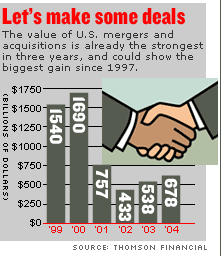NEW YORK (CNN/Money) -
Like eager holiday shoppers trying to lock up deals, corporations are making the biggest year-end merger and acquisition push since the heady days of 1999.
With Sprint (Research) and Nextel (Research) reportedly weighing a $36 billion blockbuster cell phone merger, and Johnson & Johnson (Research) said to be on the verge of a $24 billion deal for device maker Guidant (Research), the value of deals this year looks likely to cross the $700 billion mark this week for the first time since 2001, when a total of $757 billion in deals were announced.
This year's numbers don't even count the $10.3 billion deal by Oracle (Research) to buy rival business software maker PeopleSoft (Research). Thomson Financial, which tracks merger activity, counts that as a 2003 deal because that's when Oracle began its 18-month pursuit of its smaller rival.
Even without those three deals included in the numbers, the value of this year's deals stands at $678 billion, already up more than 25 percent from last year.
"You could be approaching $80 billion in announced deals for this month," said Richard Peterson, market strategist for Thomson, noting the value of deals announced or expected this month -- if they pan out -- could be the biggest for a December since 1999.
"These deals will mean a Christmas present for someone out there," he said, adding that the rebound in corporate deal making should continue into 2005 at least.
Other experts agreed.

"This has been building; it's been happening quietly for several months," Awad Asset Management Chairman James Awad said recently.
"With the election clearing the deck, I think you'll see more momentum. If you're going to have a 10 percent increase in corporate profits next year, I don't see why you couldn't be up 20 percent (in mergers and acquisitions)," he said.
If the J&J and cell phone deals go off at reported values, that would bring this year's growth to about 37 percent. That would be the best percentage gain since the 44 percent increase posted in 1997.
Thomson's Peterson said that even with strong merger activity expected next year, the pace of growth in corporate deal making will probably slow somewhat. He noted there have never been three consecutive years in which the percentage increase grew each year.
More growth seen in '05
But Peterson and others say that 2005 deals will be up from this year's levels, where ever it ends up.
"The catalyst for deals is generally rising corporate profits," he said. "We should have rising activity next year."
Rising stock prices can also spur deals, and the recent run-up in U.S. equities could lead to more.
That appeared to be the case in November, as Kmart (Research) in essence used stock that had soared 322 percent year-to-date to buy larger rival Sears (Research), whose shares had lagged this year.
A falling dollar can also drive purchases of U.S. companies by foreign companies and investors, as their home currency can buy more in the United States.
"There's been a pickup recently in foreign acquisitions in the U.S.," said Peterson. "In addition to the sliding dollar what could be fueling it is the sense that some countries' economies aren't growing as fast as ours and they're looking for the best market to improve earnings."
Still, U.S. companies have bought about $200 billion in non-U.S. assets this year, a figure not included in Thomson's $678 billion figure since the firm's numbers only track purchases of U.S. companies. That compares to only about $60 billion of overseas companies buying U.S. companies this year.
While U.S. companies might have to spend more for a European or Asian company due to the weaker dollar, they also stand to benefit from improved revenue by having more sales in stronger overseas currencies.
The breadth of the recent deals is a sign that any further gains in M&A activity will not be concentrated in one or two sectors, Awad said in an interview last month.
"You've had a build in the economy and balance sheet (improvement) since 2000," he said. "It cuts across all industries."
Still, experts don't expect deals to approach the $1.7 trillion level seen in 2000 any time soon, even with improved activity.
Samuel Weaver, finance professor at Lehigh University said recently that rising interest rates and the run-up in stock prices and company valuations will prevent some deals from getting done.
"But all in all, when you consider pluses and minuses, I definitely believe acquisitions will be on rise for next few years," Weaver said.

-- This updates a story originally published in mid-November.
|

